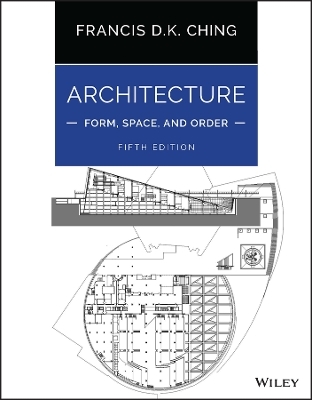
Architecture: Form, Space, and Order
John Wiley & Sons Inc (Verlag)
978-1-119-85337-4 (ISBN)
THE GOLD STANDARD IN INTRODUCTORY ARCHITECTURE TEXTS, FULLY UPDATED TO REFLECT THE LATEST DEVELOPMENTS IN THE FIELD
For more than forty years, the beautifully illustrated Architecture: Form, Space, and Order has served as the classic introduction to the basic vocabulary of architectural design. In this fifth edition, more recent additions to the architectural panoply illustrate how contemporary digital and building technologies have influenced the development of architectural forms and spaces and how architectural siting and design have responded to the call for more environmentally responsible buildings. It is designed to encourage critical thought and to promote a more evocative understanding of architecture.
The fifth edition is updated with many new urban design and building precedents from a diverse range of cultural and geographic areas
New content focuses on the latest technology and trends in structure, construction, materials, and sustainability
Includes more than 800 illustrations, many hand-drawn, which demonstrate the foundations and concepts every architect must master
Architecture: Form, Space, and Order distills complex concepts of design into a clear focus and brings difficult abstractions to life. It explains form and space in relation to light, view, openings, and enclosures and explores the organization of space, and the elements and relationships of circulation, as well as proportion and scale. In addition, the text’s detailed illustrations demonstrate the concepts presented and reveal the relationships between fundamental elements of architecture through the ages and across cultures.
FRANCIS D.K. CHING is a global authority on architectural illustration. His numerous bestselling works include Building Codes Illustrated, Building Construction Illustrated, Green Building Illustrated, and Architectural Graphics. His various books have been translated into 20 languages. He is Professor Emeritus at the University of Washington in Seattle.
Preface vii
Introduction ix
1 Primary Elements
Primary Elements 2
Point 4
Point Elements 5
Two Points 6
Line 8
Linear Elements 10
Linear Elements Defining Planes 15
From Line to Plane 14
Plane 18
Planar Elements 20
Volume 28
Volumetric Elements 30
2 Form
Form 34
Properties of Form 35
Shape 36
Primary Shapes 38
Circle 39
Triangle 40
Square 41
Primary Solids 42
Regular & Irregular Forms 46
Transformation of Form 52
Dimensional Transformation 54
Geometric Transformation 58
Subtractive Form 68
Subtractive & Additive Forms 71
Additive Form 72
Centralized Form 74
Linear Form 76
Radial Form 80
Clustered Form 82
Grid Form 86
Formal Collisions of Geometry 88
Circle & Square 90
Rotated Grid 94
Articulation of Form 98
Edges & Corners 100
Corners 101
Surface Articulation 106
3 Form & Space
Form & Space 118
Form & Space: Unity of Opposites 120
Form Defining Space 128
Horizontal Elements Defining Space 129
Base Plane 130
Elevated Base Plane 132
Depressed Base Plane 138
Overhead Plane 144
Vertical Elements Defining Space 154
Vertical Linear Elements 156
Single Vertical Plane 164
L-Shaped Configuration of Planes 168
L-Shaped Planes 169
Parallel Vertical Planes 174
Parallel Planes 176
U-Shaped Planes 180
Four Planes: Closure 186
Four Planes: Enlosure 190
Openings in Space-Defining Elements 194
Openings within Planes 196
Openings at Corners 198
Openings between Planes 200
Qualities of Architectural Space 202
Degree of Enclosure 204
Light 206
View 212
Ventilation 218
4 Organization
Organization of Form & Space 222
Spatial Relationships 223
Space within a Space 224
Interlocking Spaces 226
Adjacent Spaces 228
Spaces Linked by a Common Space 230
Spatial Organizations 232
Centralized Organizations 234
Linear Organizations 244
Radial Organizations 254
Clustered Organizations 260
Grid Organizations 270
5 Circulation
Circulation: Movement through Space 280
Circulation Elements 281
Approach 282
Entrance 290
Configuration of the Path 304
Path-Space Relationships 318
Form of the Circulation Space 322
Stairways 326
6 Proportion & Scale
Proportion & Scale 336
Material Proportions 337
Structural Proportions 338
Manufactured Proportions 340
Proportioning Systems 341
Golden Section 344
Regulating Lines 348
Classical Orders 350
Renaissance Theories 356
Modulor 360
Ken 364
Anthropometry 368
Scale 371
Visual Scale 372
Human Scale 374
A Scalar Comparison 378
7 Principles
Ordering Principles 382
Axis 384
Symmetry 392
Hierarchy 402
Datum 412
Rhythm 428
Repetition 429
Transformation 450
Conclusion 456
A Selected Bibliography 459
Glossary 461
| Erscheinungsdatum | 28.04.2023 |
|---|---|
| Verlagsort | New York |
| Sprache | englisch |
| Maße | 213 x 272 mm |
| Gewicht | 1293 g |
| Themenwelt | Technik ► Architektur |
| ISBN-10 | 1-119-85337-0 / 1119853370 |
| ISBN-13 | 978-1-119-85337-4 / 9781119853374 |
| Zustand | Neuware |
| Informationen gemäß Produktsicherheitsverordnung (GPSR) | |
| Haben Sie eine Frage zum Produkt? |
aus dem Bereich


